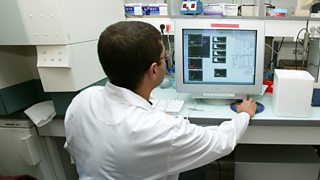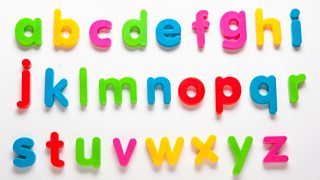Acute, microgram and fart: the everyday words the NHS website chooses to use
When it comes to the NHS, communication can be a matter of life or death. The words used to write to patients to explain their health conditions, and the explanations they find online when looking up symptoms or diagnoses, are absolutely crucial.
In Word of Mouth, Michael Rosen talks with Sara Wilcox, NHS content designer, and Consultant Dr Hugh Rayner about how they decide which words to use on the NHS website and the importance of simple, clear language that we can all understand.

-
![]()
Word of mouth: NHS language
Michael Rosen discusses the words used by the NHS with Sara Wilcox and Dr Hugh Rayner.
Why does the NHS website use such simple language?
, with something like 43 million visits a month. And because it’s used by pretty much everyone, it needs to use down-to-earth and ordinary language.
For lots of people, English isn’t their first language, and there are some who struggle to read and write for other reasons. On top of that, when people come to the website, they might be feeling anxious and panicked, or feel woozy and unwell. So it’s all about conveying the meaning in as clear and concise a way as possible, without room for misunderstanding. “We know that about four in ten people struggle to read typical health information,” says Sara. This is the type of info you might find on a pill packet, for example. “If you add in numbers it’s about six in ten people.”
When it comes to flatulence, the NHS website avoids “passing wind” or “breaking wind” because these euphemisms can actually be quite difficult for people for whom English isn’t a first language
If people have poor health literacy it can actually have an impact on their wellbeing: they are more likely to end up in A&E and more likely to have stays in hospital; they tend to miss screening tests and flu jabs and, ultimately, they have shorter and less healthy lives. By making language easy for people to understand and act on, that hopefully goes some way to preventing this. “Our focus is very much on helping people get the right care at the right time,” says Sara.
But simple doesn’t mean avoiding medical terms altogether
Although it’s all about keeping things simple, the NHS website does use medical terms. At the end of the day, patients need to understand health symptoms and any treatment or care they're getting. However, the NHS site always explains a medical term using easy to understand language. The term “diuretic”, for instance, might be followed up with: “these are tablets that make you pee more.”
Dr Hugh Rayner is leading an initiative to encourage consultants to write letters to their outpatient clinic patients directly, using clear language, rather than via their GP. Any medical term that they put in a letter to a patient (cc’d to a GP) would always be explained. For example, they might write, “You have an irregular pulse, which is called atrial fibrillation.”
“You have to be careful not to substitute every technical term with a good enough or a close enough lay term,” says Dr Rayner. “These words do mean something very specific.” And the GPs as well as the patients need to understand what's been diagnosed.
Some of the words the NHS website uses might surprise you…
, collating the words they do and don’t choose to use. Some of the choices are not what you might expect! Here are a few examples of the terms and approaches taken:
1. Pharmacy
The NHS website doesn’t use “chemist” – they opt for “pharmacy”. This is because they know the latter is far more popular as a Google search term. But if you search for "chemist" on the website, it will recognise it as a synonym.
2. Pee and poo
The NHS website started using “pee” and “poo” several years ago because they knew it was simple language that everyone can understand, including those who find reading difficult. They did get a lot of complaints! But for every negative response, says Sara, there were about ten that were positive. Most people prefer the direct and straightforward language that we all use at home. Interestingly, they don’t use “wee” because it can confuse people who use voice technologies or screen readers.
-
![]()
The NHS, AI and Our Data
David Edmonds asks whether a combination of data and artificial intelligence will transform the future of the NHS.

What are the 20 most common words?
Michael Rosen and Dr Laura Wright guide us through the top 20 words in English.
3. Bottom
As with the above, the word “bottom” is preferred to “anus” or “rectum”. User testing showed that people understand this better.

4. Fart
You might be surprised to learn that the NHS website uses “fart”. They do have a page all about “flatulence” but they explain that this means farting.
The NHS website avoids “passing wind” or “breaking wind” because these euphemisms can actually be quite difficult for people for whom English isn’t a first language. “Pass” and “wind” are simple words on their own, but put together the meaning can be missed.
5. E.g.
The site doesn’t use “e.g.” for a number of reasons. For people who use screen readers it might get read out as “egg”, and that’s very confusing! Also, some people don’t understand what it means. So instead they use words and phrases like “such as”, “including” or “like” – whichever works best.
6. Food pipe
The site might use the clinical word “oesophagus” but they’ll explain that it’s the “food pipe”, as people may not understand the medical term. And they don’t use “gullet” as they’ve found that a lot of people don’t understand the meaning of this either.

7. Incurable
They prefer “it cannot be cured” to the word “incurable”, because some people may not understand it. That’s because a lot of negative words in the English language will start with “un”, like “uncommon” for example, whereas in this case it’s an “in”.
And there’s another reason. “It cannot be cured” is deemed more sensitive than describing something as “incurable”.
8. Dosages
They would always use the full word “microgram” rather than the abbreviation “mcg”. This has come from the people who prescribe medicine, like doctors and pharmacists, who won’t use the abbreviation because it can cause errors. They don’t want people confusing “microgram” with “milligram”, which is a thousand times the dose!
9. Chronic
Although in medical circles this term means “a long-standing condition”, it’s often taken by patients to mean “really bad”. A doctor might tell someone they have a “chronic” kidney complaint, meaning they’ve had it for three months or more, but they think they’re being told it’s extremely serious.
For this reason they prefer “for a long time” or “does not go away”.
10. Acute
This means a complaint comes on very suddenly, but it doesn’t mean it’s necessarily severe. However, people don’t tend to understand that it purely refers to the timescale.
For this reason the NHS website opts for “sudden”, “starts suddenly”, “in a short period of time” or, where appropriate, “short-term”.
11. Apply
When talking about a medicine, they prefer “use”, “put on” or “rub in”.

The word order rules you use without thinking about it
Some rules about the order of words in sentences are quite complicated.
12. Normally
Instead of “normally”, they opt for “usually”. This is because, in a health context, “normally” can make people feel that they aren’t “normal”.
To learn more about the language that the NHS uses, listen to Word of Mouth: NHS Language Use.
NHS content designer Sara Wilcox co-ordinates work on .
More from Radio 4
-
![]()
Word of Mouth: NHS language
Michael Rosen discusses the words used by the NHS with Sara Wilcox and Dr Hugh Rayner.
-
![]()
How you use metaphors every day without realising
What are they, why do they exist and why do we use them in our language?
-
![]()
The most powerful word in the English language
How did a word which means nothing come to dominate our language?
-
![]()
How to talk like a Samaritan
What are the right and wrong things to say to someone who is struggling to cope?





